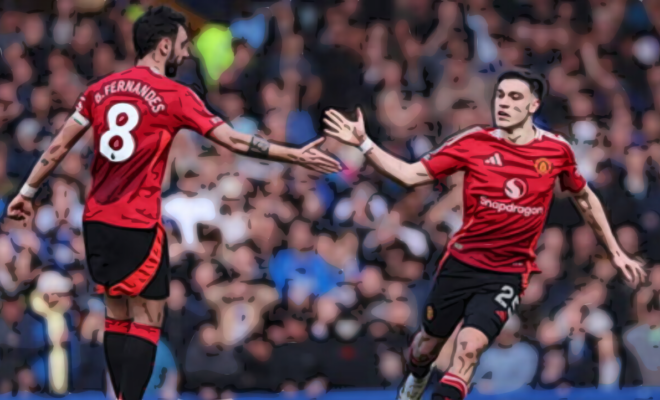Comeback Capability: Forging Arsenal’s Resilience Inspired by United’s Fightback at Goodison Park

In a tale of two halves at Goodison Park, Manchester United showcased a remarkable fighting spirit, clawing their way back from a 2-0 deficit to secure a 2-2 draw against Everton. This hard-fought point, secured after avoiding a third consecutive Premier League defeat, highlighted the Red Devils’ resilience and ability to respond positively to setbacks. For Arsenal, a team with aspirations of challenging for top honors, this match serves as a valuable lesson in cultivating a similar comeback capability, a quality that can often be the difference between victory and defeat in the unpredictable landscape of the Premier League.
Anatomy of a Comeback: Manchester United’s Response to Adversity
Manchester United’s comeback against Everton was not simply a matter of luck; it was a result of tactical adjustments, individual brilliance, and a collective belief in their ability to turn the game around. Several key factors contributed to their fightback:
- Tactical Adjustments: United’s manager, Ruben Amorim, made crucial tactical adjustments in the second half, shifting personnel and tweaking the team’s approach to unlock Everton’s defense and generate attacking momentum.
- Impact Substitutions: The introduction of players like Garnacho injected fresh energy and attacking impetus into the team, providing a different dimension to United’s play.
- Momentum-Shifting Goal: Bruno Fernandes’ stunning free-kick goal proved to be a pivotal moment in the match, igniting United’s comeback and injecting belief into the team.
- Individual Brilliance: The likes of Fernandes and Ugarte stepped up with moments of individual brilliance, showcasing their quality and determination to drag the team back into the game.
- Psychological Fortitude: United displayed remarkable psychological fortitude, maintaining their belief and composure despite facing a two-goal deficit in a hostile environment.
Amorim’s Adjustments: Tactical Tweaks and Personnel Changes
Ruben Amorim’s tactical adjustments at halftime played a key role in Manchester United’s resurgence. Recognizing the need for greater attacking impetus, Amorim made several key changes:
- Personnel Shift: Bringing on Garnacho injected pace and creativity into United’s attack, providing a different threat to Everton’s defense.
- Formation Change: Amorim may have adjusted the team’s formation, potentially shifting to a more attacking shape to commit more players forward.
- Attacking Focus: Amorim emphasized a more direct and aggressive attacking approach, encouraging his players to take risks and create scoring opportunities.
- Belief: Amorim instilled a sense of belief in his players, reminding them of their quality and ability to turn the game around.
Fernandes’ Spark: Igniting the Comeback
Bruno Fernandes’ free-kick goal was undoubtedly the catalyst for Manchester United’s comeback. The stunning strike, leaving Pickford rooted to the spot, not only reduced the deficit but also shifted the momentum of the match, injecting belief into United’s players and silencing the Goodison Park crowd.
The impact of Fernandes’ goal can be attributed to several factors:
- Technical Brilliance: Fernandes’ demonstrated his exceptional technique and accuracy, placing the free-kick perfectly into the bottom corner.
- Psychological Impact: The goal had a significant psychological impact on both teams, boosting United’s confidence and unsettling Everton’s defense.
- Leadership: As captain, Fernandes led by example, stepping up in a crucial moment and inspiring his teammates to fight back.
Everton’s Falter: Lessons in Closing Out a Game
While Manchester United deserve credit for their comeback, Everton’s inability to close out the game also played a significant role in the final result. After establishing a commanding 2-0 lead, the Toffees faltered late, allowing United to regain control and snatch a draw.
Several factors contributed to Everton’s late collapse:
- Defensive Errors: Everton’s defense became increasingly disorganized and prone to errors as the game wore on, allowing United to create scoring opportunities.
- Loss of Composure: Everton’s players appeared to lose their composure under pressure, making poor decisions and failing to maintain possession.
- Tactical Shift: Some observers noted that Everton may have switched to a more defensive posture after securing a lead, leading to them conceding the initiative.
- Inability to Adapt: Everton’s manager, David Moyes, failed to make effective tactical adjustments to stem the tide of United’s comeback.
- Missed Chances: Everton missed opportunities to extend their lead and put the game beyond United’s reach, ultimately paying the price for their profligacy.
Arsenal’s Aspiration: Forging a Comeback Mentality
Arsenal, known for their attacking flair and tactical prowess, have, at times, struggled to respond effectively to adversity. Manchester United’s comeback against Everton offers valuable lessons for Arsenal in cultivating a similar comeback capability, a quality that can prove decisive in their pursuit of silverware.
Lessons for the Gunners: Key Takeaways
Several specific lessons can be drawn from Manchester United’s performance that Arsenal can incorporate into their own game:
- Cultivate Tactical Flexibility: Arsenal should develop greater tactical flexibility, enabling them to adjust their approach mid-match and respond effectively to different game situations.
- Empower Impact Substitutes: Arsenal should empower their substitutes to make a positive impact on the game, injecting fresh energy and tactical diversity into the team.
- Nurture Leadership Qualities: Arsenal should nurture leadership qualities within their squad, encouraging players to step up in crucial moments and inspire their teammates.
- Develop Mental Fortitude: Arsenal should work on developing their mental fortitude, ensuring that they maintain their belief and composure even when facing setbacks.
- Learn to Close Out Games: Arsenal must learn to close out games effectively, maintaining their focus, composure, and tactical discipline to see out victories.
- Adapt Amorim’s Adjustments: Arsenal should analyze the tactical and personnel changes made by Amorim during the game to determine how it can implement similar adjustments.
Psychological Fortitude: The Bedrock of Comeback Capability
Beyond tactical adjustments and individual brilliance, psychological fortitude is the bedrock of comeback capability. A team’s ability to maintain belief, respond positively to setbacks, and stay composed under pressure can often be the difference between snatching victory from the jaws of defeat and succumbing to adversity.
Key aspects of psychological fortitude include:
- Belief: A deep-seated belief in the team’s ability to overcome challenges and achieve success, regardless of the circumstances.
- Resilience: The ability to bounce back from setbacks, learning from mistakes and refusing to be discouraged by adversity.
- Composure: The ability to stay calm and focused under pressure, making sound decisions and executing skills effectively.
- Leadership: Strong leadership within the squad, with players who can inspire their teammates and guide them through difficult moments.
- Positive Mindset: A positive mindset, with players who focus on solutions rather than dwelling on problems.
Potential Pitfalls: Avoiding Complacency and Maintaining Focus
While Manchester United’s success offers valuable lessons for Arsenal, it’s important to acknowledge potential pitfalls and challenges that the Gunners must avoid:
- Complacency: Arsenal must guard against complacency, recognizing that every game presents a new challenge and requiring a focused and determined approach.
- Over-Reliance on Comebacks: Arsenal should not rely solely on their ability to come back from behind, but rather strive to establish control and dominate games from the outset.
- Defensive Fragility: Arsenal must address any underlying defensive frailties that may make them susceptible to conceding early goals or losing leads.
- Discipline: Arsenal must maintain tactical discipline, avoiding mistakes that allow their opposition back into the match.
- Inability to adapt: Arsenal must demonstrate that they can adapt and adjust to the dynamic and fluid formations that its opposition puts forth.
The Road Ahead: Arsenal’s Quest for Resilience
Manchester United’s comeback against Everton serves as a powerful reminder of the importance of resilience, fighting spirit, and comeback capability in the Premier League. By cultivating tactical flexibility, empowering impact substitutes, nurturing leadership qualities, developing mental fortitude, and learning to close out games effectively, Arsenal can forge a similar comeback mentality and enhance their prospects of achieving their ambitious goals.
Ultimately, success in the Premier League is not just about talent and tactics; it’s about character, determination, and the unwavering belief that anything is possible. As Arsenal embark on their quest for glory, the lessons learned from Manchester United’s fightback at Goodison Park could prove to be invaluable, providing the Gunners with the resilience and comeback capability needed to overcome any obstacle in their path.


